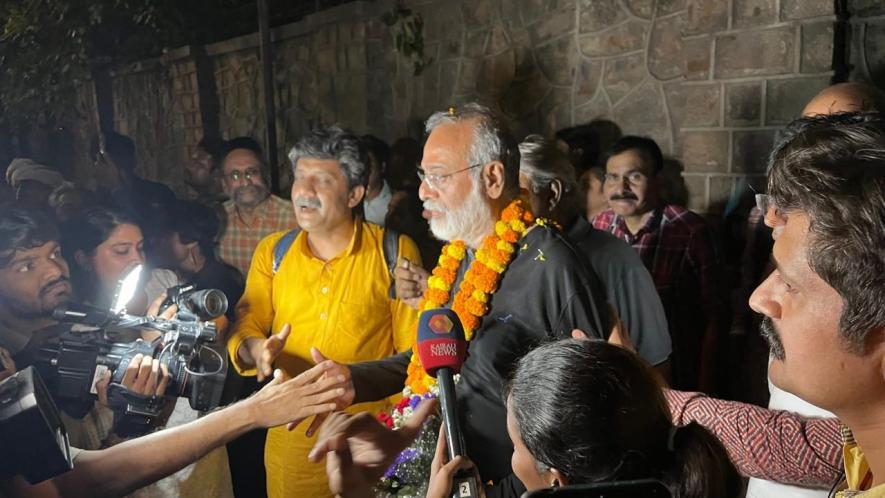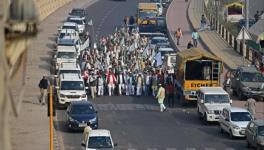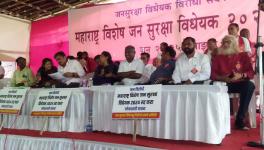Blatant Misuse of Ruling Power

Image Courtesy: Deepak Jha
The Supreme Court has supported the law regarding arrests, but the misuse of arrest powers against journalists and political opponents, like in the case of NewsClick founder Prabir Purkayastha, is concerning. While the rule of law has prevailed in some cases, the lack of support for those without economic, political, or legal resources remains a problem.
Very precious freedom is secured with the most valuable ‘rule of law’ through the judgment of the apex court on May 15, 2024 by declaring the arrest and remand of journalist online under the draconian Unlawful Activities (Prevention) Act (UAPA) by the Delhi Police as “invalid in the eyes of law”. The allegation is that the NewsClick editor using Chinese funding to promote “anti-national propaganda” through digital media, was arrested by the Delhi Police Special Cell on October 3, 2023. The mere fact that a chargesheet was filed in the case would not validate the illegality committed at the time of arrest.
In the case of Vijay Madanlal Choudhary vs. Union of India, senior advocate Abhishek Manu Singhvi highlighted inconsistencies in how the Enforcement Directorate (ED) provides grounds for arrest. Sometimes written grounds are given, while other times they are only read out or shown briefly to the accused, making it hard for them to prepare their defence. This inconsistency can prejudice the accused's ability to defend themselves during bail applications and trials.
The Supreme Court noted that under Section 3 of the PMLA (prevention of Money Laundering Act), an accused can be charged with money laundering if they are connected to the proceeds of crime. The investigation must gather facts and determine if these proceeds were generated from a scheduled offense. Without following the requirements of the Cr.P.C. and established legal procedures, such actions violate the law, according to the Supreme Court.
In the Vijay Madanlal Choudhary case, the Supreme Court highlighted several issues with how the ED operates under the PMLA. Here are the key points:
1.ECIR and Summons: The ED can summon accused persons based on an Enforcement Case Information Report (ECIR) without the accused knowing the allegations. Under Section 50 of the PMLA, the accused must make statements that are admissible as evidence. This creates an unfair situation as the accused might not be aware of the charges against them, unlike the clear provisions in the Cr.P.C. (Criminal Procedure Code) for summoning accused persons (Section 41A) and witnesses (Section 160).
2.Article 14 Violation: The Supreme Court noted that the ED is not following Chapter XII of the Cr.P.C., which outlines principles for investigations. This lack of adherence means there are no clear legal criteria or guiding principles, potentially violating Article 14 of the Indian Constitution, which guarantees equality before the law.
3. Dilution of Safeguards: The court mentioned that safeguards initially provided by Section 173 of the Cr.P.C. in the original 2002 PMLA have been weakened by amendments. Notably, amendments in 2009 and 2019 reduced protections. For example, changes to Sections 5 and 17 diluted certain safeguards, and the 2019 amendment removed a crucial protection in Section 17(1).
4.Prosecution Requirements: The court pointed out that filing a chargesheet for a predicate offense is essential under Section 19 of the PMLA, which requires reasons to believe someone is guilty. Summoning individuals under Section 50 should only happen after registering the ECIR. Any prosecution attempt without these steps is inconsistent with the PMLA and violates fundamental rights.
5.Need for Cr.P.C. Compliance: It was argued that following the Cr.P.C. is crucial as it ensures procedures established by law. Investigations must adhere to Sections 154 or 155 of the Cr.P.C. to maintain constitutional safeguards of reasonableness and fairness.
In essence, the Supreme Court criticised the ED's inconsistent and unfair practices under the PMLA, emphasising the need for adherence to established legal procedures to protect individual rights.
‘Unguided Missile’
The Supreme Court has criticised ED for its misuse of power under PMLA, calling it an "unguided missile." Here are the some more main points:
Cr.P.C. Applicability: Section 65 of the PMLA states that the Criminal Procedure Code (Cr.P.C.) should apply, but this is not being followed properly. The other violated noted: A) Non-registration of FIRs. B) Lack of a case diary. C) Restricted access to the Enforcement Case Information Report (ECIR). D) Violation of Sections 161 and 41A of the Cr.P.C. and E) Lack of magisterial permission under Section 155 of the Cr.P.C.
Constitutional Violations: This misuse of power violates Articles 14 (equality before the law) and 21 (protection of life and personal liberty) of the Indian Constitution.
Inadequate Safeguards: The PMLA lacks adequate safeguards compared to the Cr.P.C.: 1) No equivalents to Sections 41-41D, 46, 49, 50, 51, 55, 55A, 58, and 60A of the Cr.P.C., 2) Limited safeguards in PMLA to Sections 16-19 and 50, and 3) Strict bail conditions under Section 45 of the PMLA resemble preventive detention, which has more safeguards under Articles 22(3) to 22(7) of the Constitution.
The 2019 Amendment Issues: Post-2019, money laundering is a cognisable and non-bailable offense, reducing checks and balances on the ED's discretion.
In another significant case Pankaj Bansal vs. Union of India (2023), the Supreme Court emphasised that the ED must provide written grounds for arrest. These points illustrate how the ED's practices under the PMLA have been critiqued for lacking procedural fairness and violating constitutional rights.
The Supreme Court's judgment on May 15, 2024, in the case of Prabir Purkayastha v. State (2024 INSC 414), highlighted significant issues with the way the ED and police handled arrests under PMLA and UAPA.
Justice Mehta of SC, the author of the judgement Bench, explained any lapse would be a violation of Article 22(5) of the Constitution, which mandates that a person under detention should be communicated the grounds of the detention order and allowed to make a representation against the detention at the earliest opportunity.
Further, he said that communication of grounds of arrest or detention in writing by the investigating agency or police was “sacrosanct and cannot be breached under any situation”. “Non-compliance of this constitutional requirement and statutory mandate would lead to the custody or the detention being rendered illegal.
Such as the following important aspects are:
Illegal Arrest: The Supreme Court found that the ED's arrest of Purkayastha was illegal because the grounds for his arrest were not communicated in writing. This violates Section 19(1) of the PMLA, which requires the ED to inform the arrested person of the grounds of arrest in a written format.
Violation of Rights: The Supreme Court emphasised that: The accused must receive written grounds of arrest. Non-cooperation during an investigation cannot always be presumed as guilt. The ED must not use its power to arrest maliciously or with bad intent.
Liberty was ‘Hanging by a Thread’
The Supreme Court called that Purkayastha was left heavily handicapped when his liberty was hanging by a thread on October 4, 2023 morning. The SC held that the right to life and personal liberty is the most sacrosanct of fundamental rights while declaring that investigating agencies should provide people arrested under UAPA with a written copy of information specifying the grounds of their arrest.
Apex Court’s Scathing Criticism
Justice Mehta clearly explained in a scathing criticism: “This entire exercise was done clandestinely and was nothing but a blatant attempt to circumvent the due process of law; to confine the accused to police custody without informing him the grounds on which he has been arrested; deprive the accused of the opportunity to avail himself of the services of the legal practitioner of his choice to oppose the prayer for police custody remand, seek bail and also to mislead the court”. It was difficult to describe the attack on fundamental rights i.e., the Constitution of India.
The most abused by the ruling power is the fundamental right under Article 22(1). The Supreme Court proclaimed: “The right to be informed about the grounds of arrest flows from Article 22(1) (an arrested person shall be informed of the grounds of arrest and allowed to consult a lawyer of his or her choice) of the Constitution and any infringement of this fundamental right would vitiate the process of arrest and remand.” Justice Mehta, and Justice B R Gavai of the Bench.
What About Constitutional values?
It's fine. But is it enough to preach constitutional values, like wonderful poetic judgments of former SC judges, like VR Krishna Iyer? In South Indian culture, it is called ‘Pravachanam’ = ethical preaching based on epic good deeds. While thousands assumed to be ‘devotees’ enjoy a temple, forget immediately.
Where is the remedy? We learn in law colleges that even if a flash of light is thrown on a man in a theatre itself, it is enough to impose compensation under the law of Torts from Indo-British jurisprudence, which says “a violation of a legal right of someone, whether results in a legal injury or not, gives rise to an action in tort for compensation”. Is there no consequence to the blatant violation of Constitutional crime?
Where there’s a right there shall be a remedy: Is there?
Where there is a right there shall be a remedy is another great ancient jurisprudence, but there are remedies for journalists, (and ordinary people also) who languished in prison for months together. It was a clandestine manner, a blatant attempt to circumvent the due process of law, considered strong stricture in the arrest of Purkayastha, especially a non-communication for grounds of detention of this journalist. Where is the constitutional remedy?
M Sridhar Acharyulu is Professor of Law, Hyderabad. The views are personal.
Get the latest reports & analysis with people's perspective on Protests, movements & deep analytical videos, discussions of the current affairs in your Telegram app. Subscribe to NewsClick's Telegram channel & get Real-Time updates on stories, as they get published on our website.
























